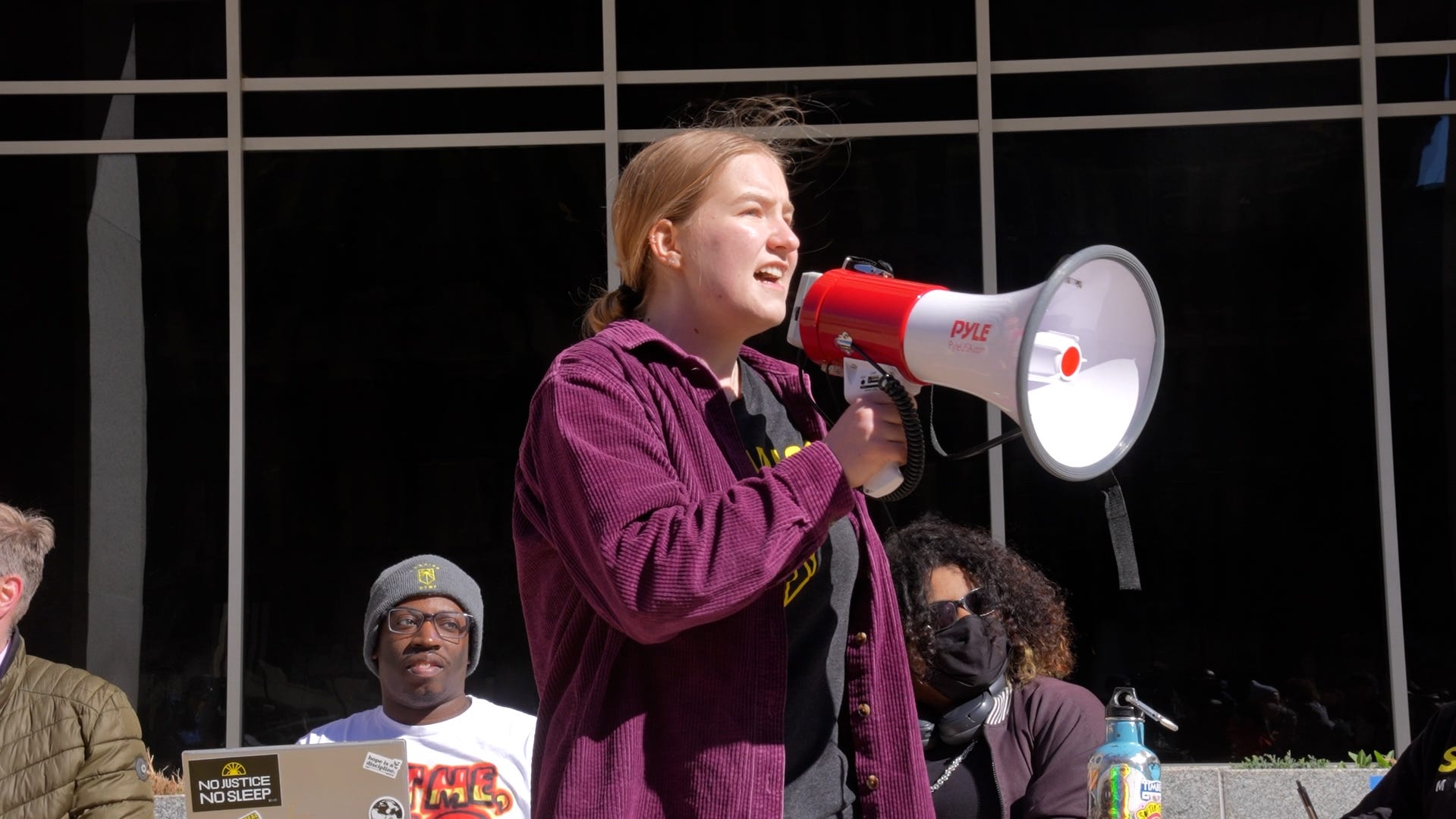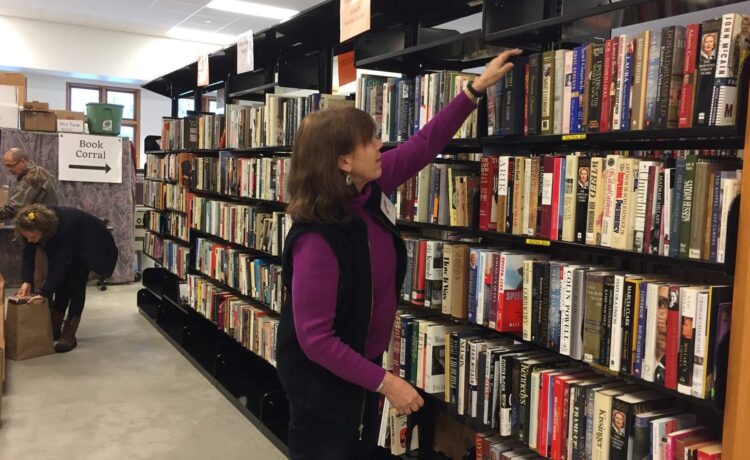
Protesters stage ‘study-in’ in front of Education Department
Protesters staged a “study-in” demonstration in front of the Education Department after President Donald Trump’s executive order.
- Michigan Electronic Library is funded by Institute of Museum and Library Services grant money, library advocates say.
- The electronic library is in jeopardy unless replacement funds are found. Other services, such as inter-library loans, also at risk, library advocates say.
- Museums get ‘little drops’ of federal money, but the dollars make a ‘pretty significant impact,’ says executive director of Michigan Museums Association.
An executive order earlier this month by President Donald Trump to reduce or eliminate the Institute of Museum and Library Services, could hit students, patrons and others at museums and archives across the country.
Cutbacks at IMLS, the federal agency that provides resources and grants to libraries and archives, could mean an impact in several areas, including:
- The ability to get a book you want to read from a library in another county in Michigan if your local library doesn’t have it.
- The ability for K-12 and postsecondary students in the Mitten State to go online any time of the day or night to do research for a paper.
- The ability for museums, large and small, in the state to inventory and update their collections, digitize their artifacts or buy specific storage bins to improve preservation of works of art.
The agency was one of seven named in the March 14 executive order to continue reducing the scope of federal bureaucracy.
More than $8 million in federal funding came to Michigan in fiscal year 2024 from IMLS, according to its website. Nearly $4.8 million went to the Library of Michigan; $1.6 million to individual libraries, and $1.77 million to museums.
“A dismantling of the Institute of Museum and Library Services would have negative implications for every American and the library services on which they rely,” Michael Rice, Michigan’s superintendent of education, said in a release. “This action would decrease access to books and other library materials and would harm residents in Michigan and across the country, especially those who live in small and rural communities.”
Changes would be ‘devastating’ to cultural, literary landscape
Michigan has just shy of 400 public libraries, 87 academic libraries, nearly 3,000 school libraries, 650 museums and hundreds of historical organizations that use these resources, according to a joint statement from seven associations and groups representing libraries and museums. It indicates the changes to the IMLS “would be devastating to the cultural and literary landscape enjoyed by all Michigan residents.”
One of the biggest impacts would be to the Michigan Electronic Library, which is funded by IMLS grant money and will be in jeopardy unless replacement funds are found, said Steven Bowers, executive director of The Library Network.
That is the centralized catalog and service created to share materials among all types of libraries in the state. The databases are used extensively by school and academic libraries, advocates say.
The Michigan eLibrary eContent includes statewide access to subscription magazines, newspapers, reference books, eBooks and more. Last year, Michigan residents accessed 19.2 million trusted articles and journals through this service. The MeLCat Catalog offers statewide access to physical books and other items. One million items were loaned throughout Michigan through this service in 2024.
Christine Beachler, president of the Michigan Association of School Librarians, said in the release that educators and students across the state use the services daily for tools for early literacy, research databases and test prep resources among other things.
The funding also provides training for librarians; summer reading and early literacy materials; training and materials to help libraries, museums and historical societies preserve their local community history, and tech support — 97% of public libraries offer Wi-Fi, with state residents making 10.7 million Wi-Fi connections at the library and checking out more than 101,000 internet hotspots last year.
More than $500,000 in federal funds also were provided to the state’s tribal libraries through various grants, advocates said.
Bowers said while funding is in place through September, after that, it’s a big unknown. He said come Oct. 1 if there is no federal or state funding, “it appears there will be no funding” for things like the electronic library. He said for many schools, the only online resource they have is through the state’s electronic library.
“No one wants it to go away,” he said, adding that libraries and their partners are hopeful the state Legislature will consider looking at funding so that everyone across Michigan continues to have access to these materials.
He said while affluent areas may be able to provide some funding for resources they may lose, “no library is going to pick up millions of dollars in online access like the eLibrary has.”
For museums: ‘Little drops’ of money; but ‘They mean something’
Lisa Craig Brisson, executive director of the Michigan Museums Association, said these federal grants might not be the biggest, but they have “a pretty significant impact” and the loss of the funds “will hinder museums to thrive and serve those communities.”
“There’s nothing sexy about this for us in the museum world,” she said, adding “… it’s very troubling for the field. This is a tiny bucket of money. Little drops being distributed around the country. But they’re little drops. They mean something. … The activities are what make it possible for all of us to benefit from these collections.”
Brisson said there are about 650 museums in Michigan, with every county in the state having one if not more. Museums are in big cities and small towns and they dot the rural communities. She said the grants help stretch projects at the museums, things they can’t fund within operations that will increase the impact of the organization.
That can include hiring staff, particularly highly professional staff from outside Michigan, which can help museums “up their game in preserving and sharing community stories and treasured things” for the community and the state as well as shoring up education programs. It can help with inventory of the large amounts of data a museum has. For the public to have full access to the data, she said, it has to be inventoried and many museums are digitizing their collections.
She said IMLS grants can be for one project or come over a period of two to three years, so museums may be in the middle of a project funded by those federal dollars. If federal funds freeze or are lost, a project may end, staff may be eliminated or the museum may have to find a way to cover the costs.
Nine museums in Michigan received federal funds in fiscal year 2024 according to the IMLS website, including $250,000 to The Henry Ford in Dearborn; nearly $406,000 to the Motown Museum in Detroit, and $172,000 to the Charles H. Wright Museum of African American History in Detroit.
“The reduction in funds and possible elimination of IMLS will impact many cultural institutions and libraries including The Henry Ford. We are extremely disappointed and watching this closely as this decision will significantly impact initiatives that are underway that preserve the important stories of America’s history,” Wendy Metros, spokesperson for The Henry Ford, wrote in an email, adding later she could not offer more specifics at this time.
According to a description on the IMLS website, The Henry Ford‘s funding will clean, rehouse and create digital catalog records for over 300 artifacts relating to energy, mobility, communications and information technology. About 100 prioritized objects will be stabilized, receive additional conservation treatment, photographed and added to museum’s digital collections, it states.
At the Motown Museum, IMLS funding will improve the archival repository for its collection of over 20,000 objects, hiring a registrar and a preparator to work with staff to update collections records, conduct environmental monitoring and supervise the installation of archival storage units, according to a description on the IMLS website.
The site also offered a description for the Wright Museum, indicating it will create leadership programs for emerging museum professionals.
Six museums elsewhere in Michigan also received federal funds. For example, the Northwestern Michigan College (Dennos Museum Center) in Traverse City received $15,760 to buy powder-coated art storage bins to improve preservation and access to approximately 225 framed works of art in its collection, according to an online description.
And Michigan Technological University Archives in Houghton received nearly $119,000 to undertake a data management project to preserve historic mining records. According to a description, the university archives preserve paper-based drilling data and geological core descriptions of the Keweenaw copper mining district for an estimated 600,000 feet of core from over 650 holes drilled from 1899 to 1970. The project will match descriptive records with existing cores, enhancing their historical value and scientific usefulness.
Contact Christina Hall: [email protected]. Follow her on X, formerly Twitter: @challreporter.
Support local journalism. Subscribe to the Free Press.
Submit a letter to the editor at freep.com/letters.












